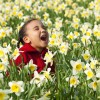How to Make Spring-Cleaning into a Math Game for Preschoolers
The days are getting longer, which means it's spring! The change of season is a perfect time to "clean up, pick up, put away," like Daniel Tiger.
Helping with household chores like spring-cleaning gives children a sense of family responsibility, says the California Preschool Curriculum Framework. It can also help them develop critical early social, civic and math skills.
As you tackle spring-cleaning, try sharing age-appropriate tasks. Watch as kids pride themselves in their work and celebrate accomplishments when each job is crossed off the list.
You can also nurture early civic skills by discussing how each family member contributes to a larger goal. Point out how every person makes a difference and has a unique role. When we highlight collaboration and teamwork, we set up lifelong civic skills.
Creating this simple family chore chart can help get your family started.
Materials

- Cardboard or construction paper
- Bowl or another round object
- Ruler or straight edge
- Marker or crayon
Step-by-Step Instructions
1. Trace a bowl, or another round object, using a marker onto the paper. Ask your child, "What shape did we make?" and point out the circle.

2. Using a ruler or straight edge, divide the circle into eight slices, like you would cut a pizza. Take a moment to talk with your child about division. Ask, "Do you notice how the pieces make up the whole pie?"
3. Write one age-appropriate chore on each slice. You might consider these:
- Put away clothes. To help kids put away clothes in their dresser, you can label each drawer with a picture and/or word of the clothing type that goes inside. In addition to helping kids refresh their sorting skills, this can also help them keep their clothes organized even outside spring-cleaning. It's also a great way to foster independence by having them pick their clothes.
- Sort toys. Have your child pick up toys and put them in the appropriate container. Remember to use location and position words and phrases like "next to" or "inside of" as you clean together to develop kids' spatial sense. You can also reach deep into the depths of big toy bins to pull out broken or missing pieces and sort those out.
- Wipe counters. Kids can easily wipe crumbs off the counter using kid-friendly cleaners and a little stool.
- Fold towels. Demonstrate how to fold bath towels and give them a chance to try it. Talking kids through it helps! Remember, it's more about the process of trying than the finished product.
- Organize books. Kids can stack, pack or rack the books scattered around the house. Putting books away is also a fantastic opportunity to use location and position words to develop spatial sense.
- Flip and fluff pillows. Ask kids to fluff up the couch or bed pillows by giving them a quick flip.
- Donate and recycle. Talk about our impact on the community and environment when we avoid throwing things into landfills. Like "Sesame Street" reminds us, we can "use it again!" Have your child select two to three items they are comfortable letting go of and take them to a local thrift store.

4. Make name labels for each member of the family. Then, arrange them on the chart. Each day, rotate the names to different tasks.
Spring-Cleaning + Math + Play = Fun
Organizing and cleaning is also a perfect time to practice early math and make a cleaning game. Here are some ways to boost these early math skills while straightening up around the house.
- Use location and position words. Math talk like, "The toy goes on top of the dresser" and "Let's sweep under the table," and even "Can we put the towel to the right of the soap?" can help kids build spatial sense and lets them know what is expected of them, which sets them up for success!
- Sort together. While children sift through clothes and toys, they sort, collect and classify objects. We do it all the time, too. Watch this video about sorting from "Peg + Cat" with your child. Then, point out the characteristics of objects. Ask questions like, "Does this piece of clothing go in the shirt pile or the donation pile?" Finally, compare the bundles and talk about how they're similar or different.
- Use ordinal numbers. Use the terms "first, second and third" when cleaning. You can say to your child, "First, we are going to look at our clothes. Second, we are going to sort them. Third, we are going to donate clothes that no longer fit us." Adding a sequence helps children break a larger task into smaller, manageable parts. It also helps us practice ordinal numbers.
- Play with patterns. Spray, wipe. Spray, wipe. That's a pattern! If kids are helping with wiping or sweeping, they are making a repetitive motion. Point out the pattern to them!
- Go on a shape hunt. As you clean, ask your child, "How many circles can you spy?" You might talk about two-dimensional shapes, like circles and rectangles, or three-dimensional shapes, like cylinders and boxes.
Spring-cleaning might seem like a daunting task, but when we each do a small part, it all adds up!


